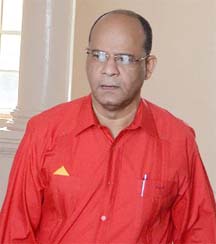Government and the opposition seem set on another collision over whether Home Minister Clement Rohee may be allowed to address the National Assembly, with Speaker Raphael Trotman awaiting legal advice on acting Chief Justice Ian Chang’s ruling on the matter.
The main opposition APNU yesterday claimed legal victory in the wake of Chang’s decision last Friday, saying Rohee cannot speak in his substantive role as minister, however, the final decision rests with Trotman.

“Mr Rohee has no right or privilege to speak in the National Assembly as Minister of Home Affairs and Mr Rohee has a right or privilege to speak as a member of the National Assembly,” APNU Shadow Attorney General Basil Williams maintained as he read from a press statement at a news conference yesterday.
APNU leader David Granger has tabled a motion to gag Rohee in the House and Trotman had referred it to Privileges Committee while in the interim restricting the minister’s participation in the National Assembly. Trotman’s decision was subsequently the subject of a court challenge by Attorney General Anil Nandlall,
In an interim ruling, Justice Chang found that Rohee as an elected member has a right to speak in the National Assembly but signalled that it does not appear to be enforceable by the court.
“…it is the view of this court that Mr Rohee’s right to speak in the National Assembly derives from his office as a member of the National Assembly and not from his office as an executive minister. This, his right as an elected member of the National Assembly must be concomitant with his constitutional duty to speak for and to represent his electors in the National Assembly who, in turn, have a concomitant right to be represented,” Chang held.
APNU yesterday reiterated its stance that it will not allow Rohee to speak in the National Assembly in his capacity as minister, while adding that if another minister wants to speak on matters on his behalf it was up to Trotman to allow it. “The Speaker will determine whether or not that is appropriate. It is the Speaker’s prerogative to determine whether or not that is appropriate,” APNU member Lance Carberry said in response to a question about the situation.
Affirming the coalition’s stance, Williams added: “Mr Rohee is prevented by the rules as long as he purports. Any other decision is in the hands of the Speaker of the National Assembly.”
However, Nandlall yesterday said he believed APNU is using parts of the ruling to justify its position and not reading and interpreting the ruling holistically before publicly articulating its views. “Clearly this is a piece of the judgment that has been pulled out. The judgment must be read as a whole and portions of it ought not to be excised and quoted conveniently to suit an interpretation which coincides with the political position of one side or the other,” he said of APNU’s quotations on the judgment.
“The Chief Justice, in very clear language, ruled that as an elected member of the National Assembly Minister Rohee has the right to bring bills and had the right to bring motions. Therefore, that he is a minister of the government sitting in the National Assembly is immaterial,” he added.
“That his right to speak is founded upon the fact that he is elected to the National Assembly by the electorate and that the electorate has a corresponding reciprocating right to have him speak on their behalf,” he added.
Nandlall said the matter now is with Trotman and he was confident that he will do what is right. “The Speaker will have to determine whether he will follow the clear pronouncement of the court or he will allow himself to be manipulated by the APNU’s jaundiced political interpretation of the ruling,” he further said.
Trotman, saying he would be seeking legal advice on the ruling, has refrained from definitively speaking on it. “I did say in a letter to the Leader of the Opposition that I would put a halt to what I was doing until the [ruling from the court came],” Trotman told this newspaper. “I did not consider any order from the High Court to be binding on me. [However], I would have to speak to my lawyers [on the ruling],” he added.
The Speaker has said that he is of the firm opinion that the National Assembly is the sole authority to develop and apply its own methods and procedures, “and these shall not be overruled by any other authority.”
He had noted that the High Court, as one of the critical and established parts of the triumvirate that comprises the organs of state, “has the duty, as guardian of our Constitution, to give interpretations in times of grave constitutional confusion. This role as interpreter is vastly different from the role of referee, or combatant, that some seem to want it to play.”




